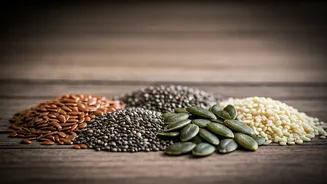Seed Powerhouses: Introduction
Heart health is a paramount concern for many, and managing cholesterol levels is a key aspect of maintaining a healthy cardiovascular system. High levels of LDL
(low-density lipoprotein) cholesterol, often referred to as 'bad' cholesterol, can increase the risk of heart disease. Fortunately, nature provides a range of solutions. Seeds, in particular, are nutritional powerhouses loaded with beneficial compounds that can help lower cholesterol and improve overall heart health. These tiny packages are rich in fiber, healthy fats, and antioxidants, all of which contribute to a healthy heart. This article will introduce six seeds that are especially effective in this regard. Incorporating these seeds into your diet can be a delicious and effective way to support your heart health, offering a natural approach to wellness that complements a balanced lifestyle. The focus here is on understanding each seed’s unique properties and how they contribute to lowering bad cholesterol, providing readers with practical information they can readily apply.
Flaxseeds: Omega-3 Boost
Flaxseeds are among the most celebrated seeds for promoting heart health. They are an outstanding source of omega-3 fatty acids, specifically alpha-linolenic acid (ALA). These fatty acids are essential for reducing inflammation, a major contributor to heart disease. Studies have shown that regular consumption of flaxseeds can lower both LDL cholesterol and triglyceride levels, improving the overall lipid profile. Furthermore, flaxseeds are rich in soluble and insoluble fiber. The soluble fiber helps to bind with cholesterol in the digestive system, preventing its absorption and promoting its excretion. Insoluble fiber aids in digestive health, promoting regularity and aiding in the body's natural detoxification processes. To harness the benefits of flaxseeds, you can incorporate them into your diet by adding them to smoothies, sprinkling them on cereal, or mixing them into baked goods. Remember to consume ground flaxseeds rather than whole seeds to maximize nutrient absorption, as the body cannot easily break down the whole seeds.
Chia Seeds: Fiber Rich
Chia seeds, tiny yet mighty, are another excellent addition to any heart-healthy diet. Like flaxseeds, chia seeds are packed with fiber, both soluble and insoluble. The high fiber content is crucial for lowering LDL cholesterol levels. Soluble fiber binds to cholesterol in the digestive tract, preventing its absorption into the bloodstream, while insoluble fiber supports healthy digestion. Chia seeds are also a good source of omega-3 fatty acids and antioxidants. These components work together to reduce inflammation and protect the heart from damage. Consuming chia seeds can help improve overall cardiovascular health. The versatility of chia seeds is one of their most appealing features. They can be easily added to a variety of foods and beverages. Try adding them to yogurt, oatmeal, or salads, or using them to create chia seed pudding. The gel-like consistency that chia seeds develop when soaked makes them a satisfying and filling food, helping with weight management and further supporting heart health.
Hemp Seeds: Complete Protein
Hemp seeds, also known as hemp hearts, are unique because they offer a complete protein, meaning they contain all nine essential amino acids. This makes them a valuable addition to both vegetarian and non-vegetarian diets. Hemp seeds also provide a balanced ratio of omega-3 and omega-6 fatty acids, which is essential for reducing inflammation and supporting heart health. The healthy fats in hemp seeds contribute to the reduction of LDL cholesterol and the increase of HDL (high-density lipoprotein) cholesterol, which is the 'good' cholesterol that helps clear arteries. In addition, hemp seeds contain arginine, an amino acid that helps produce nitric oxide, a molecule that relaxes blood vessels and improves blood flow. This can significantly reduce blood pressure, further benefiting cardiovascular health. To incorporate hemp seeds into your diet, sprinkle them on salads, add them to smoothies, or use them as a topping for your favorite dishes. They have a mild, nutty flavor that complements various foods.
Pumpkin Seeds: Zinc Power
Pumpkin seeds are a delicious and nutrient-rich snack that also offers significant heart health benefits. They are an excellent source of magnesium, which plays a crucial role in regulating blood pressure. Adequate magnesium intake is associated with a lower risk of heart disease and stroke. Pumpkin seeds are also rich in antioxidants, which protect the heart from oxidative stress and damage caused by free radicals. These antioxidants help prevent the buildup of plaque in the arteries, reducing the risk of atherosclerosis. Furthermore, pumpkin seeds contain phytosterols, plant compounds that can help lower LDL cholesterol levels by blocking its absorption in the digestive tract. You can enjoy pumpkin seeds roasted or raw, making them a versatile snack. They can also be added to salads, trail mixes, or used as a topping for yogurt or oatmeal. The combination of nutrients in pumpkin seeds makes them a valuable addition to any heart-healthy diet.
Sunflower Seeds: Vitamin E
Sunflower seeds are another excellent choice for boosting heart health, known for their high content of vitamin E, a potent antioxidant that protects cells from damage. Vitamin E helps prevent the oxidation of LDL cholesterol, a process that can lead to the buildup of plaque in the arteries. This, in turn, reduces the risk of atherosclerosis and heart disease. Sunflower seeds also contain phytosterols, similar to pumpkin seeds, that help lower LDL cholesterol. In addition, these seeds provide magnesium, which supports healthy blood pressure levels. Including sunflower seeds in your diet can contribute to overall cardiovascular health. They can be eaten as a snack, added to salads, or incorporated into various recipes. Roasting sunflower seeds enhances their flavor and makes them even more enjoyable. The combination of antioxidants, phytosterols, and magnesium makes sunflower seeds a valuable addition to a heart-healthy lifestyle.
Sesame Seeds: Lignan Boost
Sesame seeds are small, but they pack a significant nutritional punch, particularly in the realm of heart health. They are rich in lignans, a type of antioxidant that may help lower cholesterol levels. Lignans can bind to cholesterol in the gut, preventing its absorption and aiding in its excretion. Sesame seeds also contain phytosterols, which contribute to lowering LDL cholesterol, and magnesium, vital for regulating blood pressure. Moreover, these seeds offer a good source of fiber, further aiding in cholesterol management and promoting healthy digestion. Including sesame seeds in your diet can be both easy and enjoyable. They can be sprinkled on salads, used as a topping for stir-fries, or added to baked goods. Sesame seeds are also a key ingredient in tahini, a paste used in many Middle Eastern and Mediterranean dishes. Regularly consuming sesame seeds can provide a range of heart-healthy benefits, making them a simple yet powerful addition to your diet. Their rich flavor also adds a delightful dimension to many meals.




















